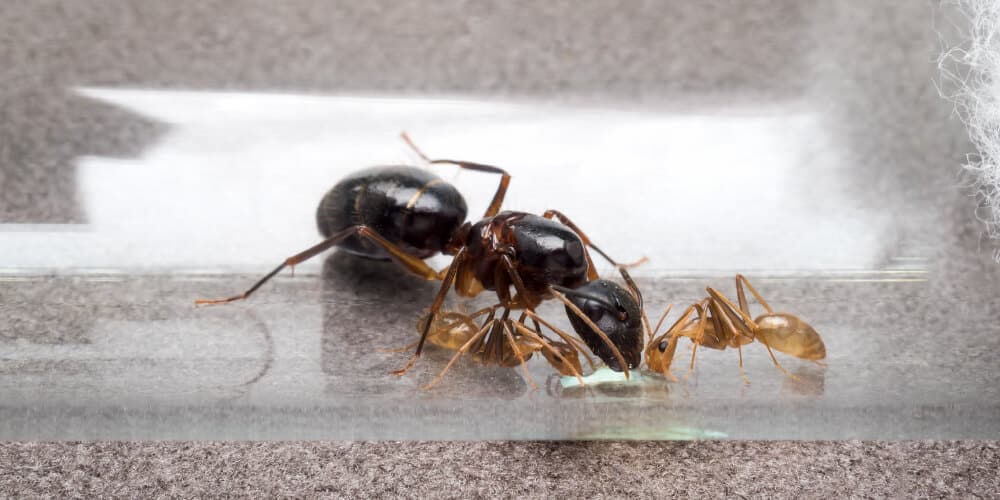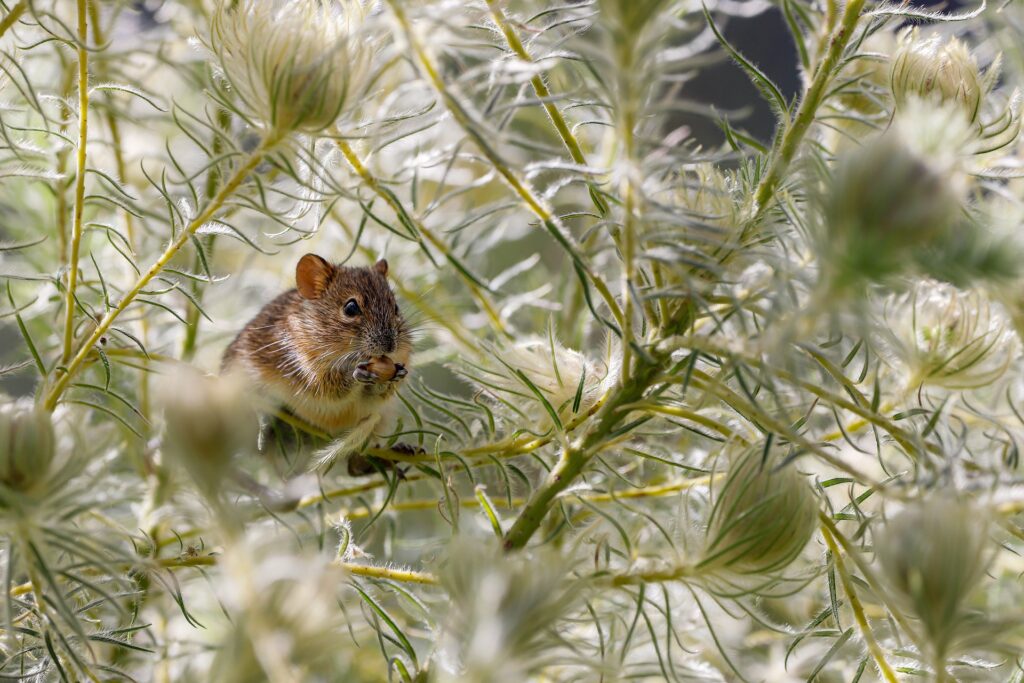Have you ever wondered what it would be like to live the life of a royal, like queen ants? Turns out you don’t have to visit Buckingham Palace to get a glimpse at the royal life. All that regal glitz and glamor can be found in a backyard anthill. However, while being queen of an ant colony comes with a few perks, there is far more responsibility and danger.
How to Identify a Queen Ant
There are a few ways to identify a queen ant from the rest of the colony. In terms of size, queen ants are typically bigger than other ants in the colony. They also have thicker bodies and abdomens than worker ants. Queen ants are born with wings, but will eventually shed them. You may notice small stubs on the side of a queen ant indicating she has lost her wings.
Additionally, if you ever notice a larger ant surrounded by small ants, this is more than likely a queen. A worker ant’s job is to feed, clean, and protect the queen so it is normal to see them climb all over her. While not visible, another differentiator between queens and other ants is lifespan. Queen ants can live up to a few decades whereas worker ants and drones have a lifespan of a few months to a few years.
A Queen Ant’s Role
Despite the prestigious title, the queen doesn’t actually rule over a kingdom, or colony, of ants. She doesn’t have any special decision-making powers or authority. However, queen ants do provide for their colony in ways the other ants come.
Queen ants have two very important roles in the ant kingdom. The first role they take on is colonizing. Once she has mated with a male any, a queen ant will leave her birth colony and establish a new colony elsewhere. Once she has settled on a location, the queen ant will lay her first set of eggs. These eggs will hatch, develop, and become the first generation of the colony’s worker ants.
Once the colony is stable and established, the queen ant’s sole role is to continuously lay eggs. The sex of these eggs is determined by whether they are fertilized or not. Depending on the colony’s needs, the queen ant will lay fertile eggs, which become female worker ants, and unfertile eggs, which become male ants. Of the fertile eggs, the pupae that are cared for and fed most will eventually become queens and start their own colonies.
Rapid-Fire Facts About Queen Ants
- Life Span: Queen ants have incredibly long life spans compared to worker ants. Depending on the species, queen ants can live for several years, and in some cases, even decades.
- Reproductive Role: The primary role of a queen ant is reproduction. She is responsible for laying eggs, which hatch into the colony’s workers, drones (males), and future queens.
- Fertilization: Queen ants engage in a single mating flight early in their lives, during which they mate with several male ants. After this flight, they store the sperm from these encounters to fertilize eggs throughout their lives.
- Size: Queen ants are typically much larger than worker ants. This larger size is due to the energy reserves needed to produce eggs continuously.
- Social Hierarchy: Within the ant colony, the queen holds the highest position in the social hierarchy. Her presence maintains the cohesion and functioning of the colony.
- Communication: Queen ants communicate with other members of the colony using chemical signals known as pheromones. These chemical signals help regulate the behavior and organization of the colony.
- Winged Queens: In some ant species, young queens have wings, which they use during their mating flights. Once they have mated and established a new colony, they shed their wings, as they are no longer needed.
- Colony Foundation: After mating, a queen ant will search for a suitable nesting site to establish her colony. She will then lay her eggs and care for the first brood until they mature into worker ants capable of taking over the tasks of foraging and caring for the colony.
- Replacement: If a queen ant dies or becomes incapable of performing her duties, the colony may produce a new queen through a process called supersedure or sometimes by swarming, where a portion of the colony leaves with a new queen to establish a new nest.
- Longevity of Influence: Even after her death, the pheromones of a queen can continue to influence the behavior of the colony for some time, affecting aspects such as worker ant productivity and colony cohesion.
Queen Ant Control
Queen ants can produce thousands and thousands of ants during their lifetime. These ants are constantly in search of food supplies and water sources for the colony. As a result, it is very common to discover ants in your home at one point or another. This is especially the case during a drought or at times when resources are scarce. In order to make your home less attractive to foraging ants, follow these tips:
- Make sure food is properly sealed.
- Keep dirty dishes from piling up in the sink.
- Wipe down kitchen counters and surfaces frequently to remove crumbs and food residue.
- Repair sources of excess moisture, such as leaky water fixtures and poor exterior drainage.
- Seal potential entry points, such as gaps under doors and cracks around windows, to your home.
- Call a pest control expert to locate and exterminate surrounding colonies and nests.
Carpenter Queen Ants
Carpenter queen ants pose a unique challenge in pest control due to their remarkable longevity. A carpenter ant queen can live up to 25-30 years, which is extraordinarily long-lived for an insect. Unlike their worker counterparts, carpenter queen ants have wings, allowing them to fly and start new nests, making infestations more difficult to eradicate. Because of their long life, these queens will lay thousands of eggs, enabling colonies to rapidly repopulate even after treatment. To effectively control carpenter ant infestations, it is crucial to locate and eliminate the queen ant. Killing worker ants alone will not prevent the colony from rebuilding. Specialized techniques, such as baiting or targeted insecticide applications, are often employed to target and eliminate carpenter queen ants.
If ants are present inside your home, or you have anthills in your yard, your best bet is to call a pest control expert such as Aptive Environmental. Depending on species and habitat, an Aptive pest specialist will be able to determine the most effective and safest treatment option. Furthermore, if the colony is not located in your yard, it can be difficult to locate. An Aptive pest specialist will be able to control and treat ants in hard-to-reach places such as your home’s crawl spaces and ductwork. Aptive’s dedication to customer service and commitment to the environment distinguish us from our competitors. If you have a pest problem that needs controlling, call Aptive Environmental today.










